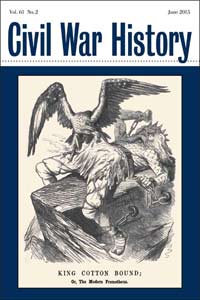June 2015, Volume 61, No. 2
Mar 20th, 2015The Lincoln Administration’s Negotiations to Colonize African Americans in Dutch Suriname
by: Michael J. Douma
Previous attempts to write the history of the Lincoln Administration’s negotiations with the Dutch to send African American colonists to Suriname were written using a limited number of English-language sources found mostly in official primary source publications. Previous historians have, therefore, presented an incomplete and incorrect understanding of the significance of Suriname for Lincoln’s colonization plans.
Previously untapped Dutch-language sources in the collection the Netherlands’ Department of Foreign Affairs present a much more complete and complex view of the subject. Dutch-American negotiations regarding colonization were conducted mostly after the Emancipation Proclamation. The chief Dutch diplomat in the United States, Roest van Limburg, stood at the center of a diplomatic exchange to encourage colonization. Dutifully, van Limburg followed up on requests for information from his government. His frustration grew, however, because of massive diplomatic delays and inefficiencies. In the end, Dutch Suriname failed as a viable destination for African American colonists, not, it appears, primarily because of Lincoln’s changing views on the subject, but because of the difficulties of ratifying and organizing such a plan in the changing atmosphere of failed colonization attempts in Panama and Haiti. Undeterred, Dutch agents in 1865 worked without American political support to recruit African Americans.
North Atlantic Trade in the Mid-Nineteenth Century: A Case for Peace during the American Civil War
by: Niels Eichhorn
Historians have frequently talked about “King Cotton” and the financial ties between European countries and the United States during the American Civil War. However, no study has yet assessed the war’s impact on trade. This essay will introduce a series of overlooked sources to illustrate the trade relations of Great Britain, France, Bremen, and the United States. Based on the trade data, the paper illustrates that a European intervention was unlikely, because European powers adjusted quickly to the changed situation in North America and found other markets to compensate for the depressed situation in the United States. For the United States, the paper shows that Confederate privateering had little impact and did not eradicate U.S. commerce. Overall, an analysis of the North Atlantic trade during the American Civil War era adds another important component to the scholarship, placing the Civil War in a global perspective.
Michael J. Douma is visiting assistant professor of history at James Madison University and author of How Dutch Americans Stayed Dutch (2014). His articles have appeared in the New York Times, American Studies, and the South African Historical Journal.
Niels Eichhorn is assistant professor of history at Middle Georgia State College and a recent graduate of the University of Arkansas. His dissertation (which he is revising for publication) explores the relationship between European separatist migrants and their reactions to the outbreak of war in the United States. He is the author of “The Intervention Crisis of 1862: A British Diplomatic Dilemma?” American Nineteenth Century History (2014).
Laughlin-Schultz, Bonnie. The Tie That Bound Us: The Women of John Brown’s Family and the Legacy of Radical Abolitionism. Reviewed by John C. Kennedy.
Soike, Lowell J. Necessary Courage: Iowa’s Underground Railroad in the Struggle against Slavery. Reviewed by Don Elder.
Salafia, Matthew. Slavery’s Borderland: Freedom and Bondage along the Ohio River. Reviewed by Ralph Mann.
Kvach, John F. De Bow’s Review: The Antebellum Vision of a New South. Reviewed by William D. Carrigan.
Cohen, Michael David. Reconstructing the Campus: Higher Education and the American Civil War. Reviewed by K.A. Wisniewski.
Harris, William C. Lincoln and the Union Governors. Reviewed by Stephen D. Engle.
Earle, Jonathan and Diana Mutti Burke, eds. Bleeding Kansas, Bleeding Missouri: The Long Civil War on the Border. Reviewed by Zachary S. Garrison.
Wright, Ben and Zachary W. Dresser, eds. Apocalypse and the Millennium in the American Civil War Era. Reviewed by Colin Edward Woodward.
Hewitt, Lawrence Lee, Arthur W. Bergeron Jr., and Thomas F. Schott, eds. Confederate Generals in the Trans-Mississippi, Volume 1: Essays on America’s Civil War. Reviewed by Kyle S. Sinisi.
Wills, Brian Steel. Confederate General William Dorsey Pender: The Hope of Glory. Reviewed by Joe R. Bailey.
Peraino, Kevin. Lincoln in the World: The Making of a Statesman and the Dawn of American Power. Reviewed by Frank J. Cirillo.
Rodrigue, John C. Lincoln and Reconstruction. Reviewed by Keith Hebert.
Magliocca, Gerard N. American Founding Son: John Bingham and the Invention of the Fourteenth Amendment. Reviewed by Clinton W. Terry.
Baker, Bruce E. and Brian Kelly, eds. After Slavery: Race, Labor, and Citizenship in the Reconstruction South. Reviewed by Boyd R. Harris.
Smith, John David and J. Vincent Lowery, eds. The Dunning School: Historians, Race, and the Meaning of Reconstruction. Reviewed by Otis Pickett.
Thomson, David K. We Are in His Hands Whether We Live or Die: The Letters of Brevet Brigadier General Charles Henry Howard. Reviewed by David K. Graham.


